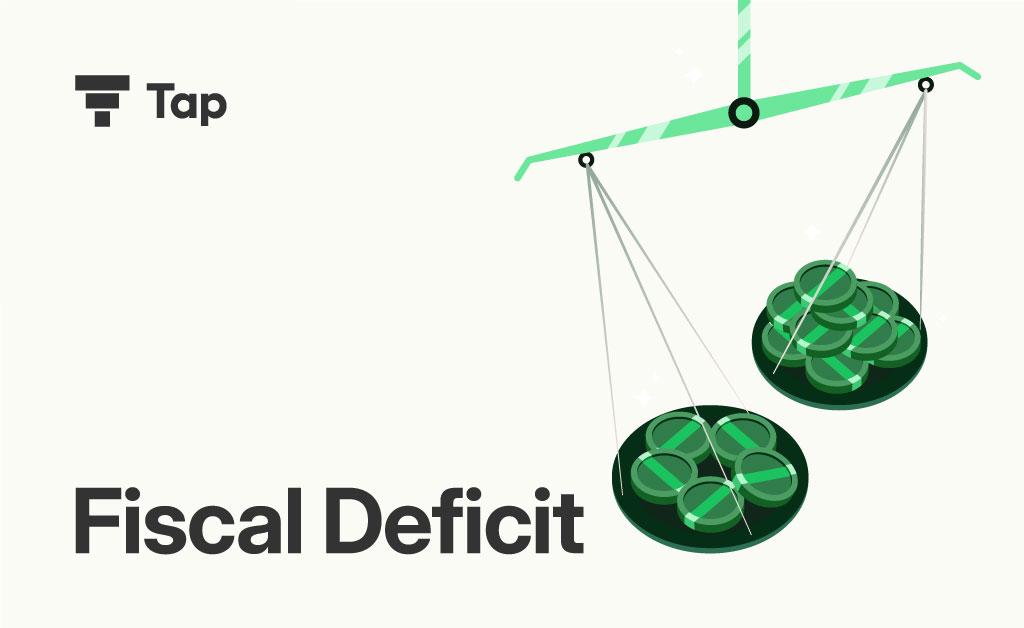Understanding Fiscal Deficit: Meaning, Formula, and Insights into India’s Fiscal Deficit

Introduction:
The fiscal deficit is a critical economic indicator measuring the gap between a government’s total expenditures and revenue (excluding borrowing). Understanding the fiscal deficit is essential for grasping a nation’s economic health and financial management strategies. This article delves into the fiscal deficit’s meaning, formula, India’s fiscal deficit, and relevance for UPSC aspirants.
Fiscal Deficit Meaning:
The fiscal deficit represents the shortfall in a government’s finances when its total expenditures exceed its total revenue. This deficit highlights the government’s borrowing needs to bridge the gap and sustain its spending on various public services and infrastructure projects. The fiscal deficit indicates how much the government needs to borrow to meet its expenses.
What is Fiscal Deficit?
The fiscal deficit is a clear indicator of a country’s economic health. A high fiscal deficit suggests that the government is spending beyond its means, which could lead to increased borrowing and debt accumulation. Conversely, a low budgetary deficit indicates better financial management and sustainability.
Fiscal Deficit Formula:
The fiscal deficit is calculated using the following formula:
Fiscal Deficit=Total Expenditure−Total Revenue (excluding borrowings)\text{Fiscal Deficit} = \text{Total Expenditure} – \text{Total Revenue (excluding borrowings)}Fiscal Deficit=Total Expenditure−Total Revenue (excluding borrowings)
This formula captures the essence of the fiscal gap, providing a straightforward measure of how much the government needs to borrow.
Fiscal Deficit of India:
India’s fiscal deficit has been a focal point of economic discussions and policy decisions. The government sets the fiscal deficit target, usually expressed as a percentage of the Gross Domestic Product (GDP). For the fiscal year 2024-2025, the Indian government has set a fiscal deficit target of 4.9% of GDP, down from previous years.
Recent Trends and Budget 2024:
Finance Minister Nirmala Sitharaman presented the Union Budget 2024, further reducing the fiscal deficit target to 4.9% for FY25. This move is part of the government’s fiscal consolidation strategy, which aims to reduce debt and promote sustainable economic growth. The fiscal deficit has declined due to increased tax revenue, rationalising subsidies, and controlled public expenditure.
Fiscal Deficit UPSC:
For UPSC aspirants, understanding the fiscal deficit is crucial as it is a significant topic in the economics section of the exam. The fiscal deficit is often discussed in government budgets, economic policies, and financial stability. Key points to remember for UPSC include:
- Definition and Meaning: Understanding what fiscal deficit signifies and its economic implications.
- Calculation Formula: Knowing the formula to calculate the fiscal deficit.
- Current Trends: Being aware of the latest fiscal deficit targets and measures taken by the government.
- Impact on Economy: Analyzing how the fiscal deficit affects inflation, interest rates, and overall economic growth.
- Government Policies: Studying the policies and strategies to manage and reduce the fiscal deficit.
Conclusion: Why is fiscal deficit necessary?
The fiscal deficit is a vital economic measure that reflects a nation’s financial health. It provides insights into government borrowing needs and financial management practices. Maintaining a controlled fiscal deficit is crucial for sustainable economic growth and stability in India. Understanding the fiscal deficit, its meaning, formula, and current trends, especially India’s fiscal deficit, is essential for policymakers, economists, and UPSC aspirants alike.
You are still reading? It means you are interested in finance and financial growth, right? Your individual financial growth is important as it can have positive impact on the countries financial growth. Start investing in fixed income instruments today and diversify your investment portfolio. Don’t think about how to invest, just sign up on TapInvest and start investing.
FAQs On Fiscal Deficit:
Q: What is the fiscal deficit?
A: Fiscal deficit is the difference between a government’s total expenditure and revenue, excluding borrowings.
Q: How is the fiscal deficit calculated?
A: The fiscal deficit is calculated using Fiscal Deficit = Total Expenditure—Total Revenue (excluding borrowings).
Q: Why is fiscal deficit significant?
A: Fiscal deficit indicates the borrowing needs of a government and reflects its financial health and management practices.
Q: What is India’s fiscal deficit target for FY25?
A: The fiscal deficit target for India in FY25 is set at 4.9% of GDP.
Q: How does a high fiscal deficit affect the economy?
A: A high fiscal deficit can lead to increased borrowing, higher debt, inflation, and potential economic instability.
